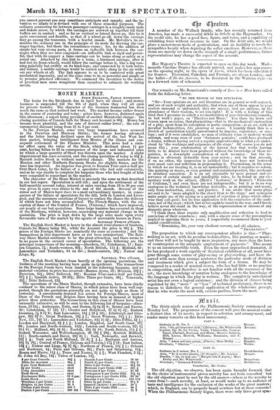Our remarks on Mr. Bourcicault's comedy of Lore in a
.illaze have called forth the following letter.
"TO THE EDITOR OF THE SPECTATOR.
"Sir—Your opinions on art and literature are in general so well matured, and are of such weight and authority, that when any of them appear to your readers unsound or unfounded, they are uneasy, and are anxious, in the abundance of their wisdom, to set you right! It is with a feeling of this kind that I presume to solicit a reconsideration of your introductory remarks, in last week's paper, on 'Theatres and Music.' You there lay down and reason upon an axiom, that playmaking—that is, the mechanical construction of a play, apart from its conception or poetic composition—is an art, with its peculiar technicalities, like painting or music. I humbly think this is a stretch of assimilation totally unwarranted by inquiry, experience, or ana- logy; and if it were established, no man of ordinary sense or modesty would attempt, and none even of your fortunate geniuses' could have produced a drama, without having served a regular apprenticeship to what you under- stand by the workings and exigencies of the stage.' Of course you do not mean this ' • your confirmation of the known fact that works leaving little to be desired have been produced without the knowledge of these re- quisites, is a downright contradiction of such meaning : but the in- ference is obviously deducible from your axiom ; and on that account, if on no other, the impression is justified that you have not bestowed your usual care and reflection in propounding it. Playmaking, in the sense in which we are treating it, is an art undoubtedly ; but it requires no school, like painting or music, or even gradual and sustainedpractice, like mechanic or artistical execution. It is an art attainable by mere perusal and ob- servance of certain simple and intelligible rules, to be found in any ele- mentary ,work on the subject, (Blaze's Lectures,' or Kames's Elements of Criticism ') and even these are not indispensable ; but it is in no way analogous to the technical knowledge derivable, as in painting and music, only from instruction, study and practice. I am aware that many plays are said to be more adapted to the closet than to the stage,' and managers make ample use of the saying as a ground of rejection of plays which other- wise they call good ; but its true application is to the exigencies of the audi- ence, not of the stage • which last never ought to stand in the way, and I firmly believe never did stand in the way, of the representation or success of any dramatic piece whatever. "I think these ideas require only amplification and reflection to lead to conviction of their soundness ; and, with a sincere sense of the presumption implied in opposing them to yours, I respectfully recommend them to your candid consideration.
"Remaining, Sir, your very obedient servant, and old admirer,
" DRAMATICITS."
The proposition to which our correspondent alludes is this—" Play- making is an art, with its peculiar technicalities, like painting or music ; and these will not be taught by mere inspiration, any more than the laws of counterpoint or the adequate employment of pigments." This seems to us an incontrovertible truth. Even the most unpractised dramatist, if he has produced a work capable of theatrical exhibition at all, must have gone through some course of play-seeing or play-reading, and have ob- served with more than average acuteness the particular mode of division and treatment which give a subject the form of a drama. He may be compared to a reader of musical scores, who has had little or no practice in composition, and therefore is not familiar with all the resources of his art; the mere knowledge of notation being analogous to the knowledge of the language in which the play is written. The completely untechnical artist has not even a logical existence ; and the division of clauses being regulated by the " more " or " less " of technical proficiency, there is no reason to disbelieve the general application of the wholesome precept, that he who works the most will, mteris paribus, learn the most.


























 Previous page
Previous page